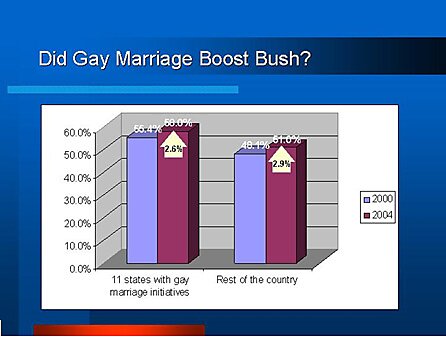The 2004 initiative to ban same‐sex marriage in Ohio “helped cause a surge in turnout of ‘values voters,’ who helped deliver this pivotal state to President Bush’s successful reelection effort,” the Washington Post proclaims on the front page today. That’s been the story line since 2004: 11 state votes on banning gay marriage turned out religious and conservative voters, and that helped Bush win his narrow reelection, especially in Ohio, where a Kerry win would have given Kerry an electoral vote majority.
But is it right? There’s good evidence that it isn’t.
It’s true that states with such initiatives voted for Bush at higher rates than other states, but that’s mostly because the bans were proposed in conservative states. In fact, Bush’s share of the vote rose just slightly less in the marriage‐ban states than in the other states: up 2.6 percent in the states with marriage bans on the ballot, up 2.9 percent in the other states.
Political scientist Simon Jackman of Stanford has more here (pdf). He concludes that the marriage referenda tended to increase turnout but not to increase Bush’s share of the vote. And in a county‐by‐county analysis of Ohio, he found no clear relationship between increased turnout, support for the marriage ban, and increased support for Bush.
A broader claim grew out of the 2004 exit polls showing that more voters chose “moral values” than anything else as their most important issue. “Ethics and moral values were ascendant last night—on voters’ minds, in Americans’ hearts,” William J. Bennett wrote the next morning on National Review Online. But that claim also fails careful analysis. In the exit poll 22 percent of voters said that “moral values” were most important to them, larger than any other single choice. But if you combined Iraq and terrorism, and economy/jobs and taxes, then both foreign policy and economic policy were most important to more voters.
In addition, of course, it’s not clear what “moral values” means. The Los Angeles Times exit poll, which asks the question a different way, found that 40 percent of voters surveyed selected “moral/ethical values” as one of their two most important issues in 2004–the same percentage as in 1996, when they reelected Bill Clinton. Some voters may think that poverty, the environment, war, individual freedom, or any number of other things are “moral issues.”
Some people say the Republicans got more votes from regular church‐goers. But in Ohio, the share of the electorate represented by frequent churchgoers actually declined from 45 percent in 2000 to 40 percent in 2004. I think the Republicans had already done a thorough job of getting regular churchgoers to the polls. Their great accomplishment in 2004 was combing the country to find un-organized voters who would vote Republican if you got them to the polls.
So then why did Bush win? It’s terrorism, stupid. The most important number in the exit polls was this: 58 percent of respondents said they trusted Bush to handle terrorism, while only 40 percent trusted Kerry. You can’t win a post‑9/11 election if only 40 percent of voters trust you to protect them against terrorists; people may not be happy with the war in Iraq, but they thought terrorism was the bigger issue.
There were strong swings to Bush in Rhode Island, New Jersey, Connecticut, and New York, stronger than in all but one of the 11 marriage‐ban states. Those are states that felt the threat of terrorism most directly after 9/11.
And then, of course, there was the freedom issue.
Bush told voters, “My opponent is against personal retirement accounts, against giving patients more control over their medical decisions through health savings accounts, against providing parents more choices over education for their children, against tax relief for all Americans. He seems to be against every idea that gives Americans more authority and more choices and more control over their own lives.”
If it hadn’t been for the war in Iraq — which tended to cut in a different direction from the war on terror — and the loss of libertarian voters who no longer believed his rhetoric about freedom, Bush might have actually won the big victory that economic models of the election predicted.
But it’s time to lay to rest the idea that Bush won Ohio and the presidency on the strength of anti‐gay‐marriage votes.

